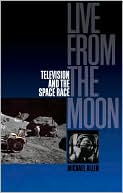

 |

|

The average rating for Live from the Moon: Film, Television and the Space Race based on 2 reviews is 3.5 stars.
Review # 1 was written on 2018-07-12 00:00:00 John Joseph Mcenery John Joseph MceneryTurned out to be a fairly high level overview of Nasa from the Mercury Program through Deke Slayton's mission. Given it's length, I didn't expect much more. That being said, given its title I was hoping that more of the content was directed specifically at the Apollo program. A good quick read for anyone that wants a easy-to-read high level summary of Nasa's efforts from '59 through the mid 70s. I give this 4 stars instead of 3 because contributors Slayton and Shepard are true American heroes; the book is based on their first hand experiences and impressions, which I found to be compelling. In sum, a quick must-read for anyone interested in the experience of the Mercury Seven, if not a brief history of the space program from Mercury through Apollo. |
Review # 2 was written on 2014-03-28 00:00:00 Ashley Wilson Ashley WilsonWhen I first heard of Sputnik I was walking across Ashtead Common with Nigel and Aunty Gill. It sticks in my mind because, even before my 5ᵗʰ birthday, I knew my understanding of the world was suddenly outdated. When Apollo 11 landed I was on CCF camp near Stirling, and the NAAFI tent with the tiny B&W TV was heaving with 16-year-olds in battledress. Space exploration since then has been a bit of a let-down. So of course I was going to read this book. The world probably didn't need any more books on Apollo 11 - indeed, it probably didn't need any more books on Apollo 11 with Moonshot in the title - but this is a pretty clear and readable account, once you accept that it was probably unavoidable to interweave the mission with the preparations. The author comes across as British (though there is no bio in the book), and that is a strength since it spares us the ra-ra everything-is-superlative approach Americans often adopt when talking about their nation's achievements. Parry has a nice clear understated style that works well. One surprise, though, is his use of feet, pounds & Fahrenheit. I know it's what NASA used at the time, but it's still unduly quaint in the 21ˢᵗ century. Yes, he does often include conversions (eg "103,000 lb (51 tons)"), though it's still unclear whether he means US tons (907 kg) or Imperial tons (1,120 kg); doesn't make a huge difference, but feels sloppy. There are a lot of names and acronyms to keep track of, but you can follow the story without being obsessive about the former while the latter are listed at the back (as I found out after reading). Overall, I'm glad I read it but it wouldn't have taken much to make it better. |
CAN'T FIND WHAT YOU'RE LOOKING FOR? CLICK HERE!!!